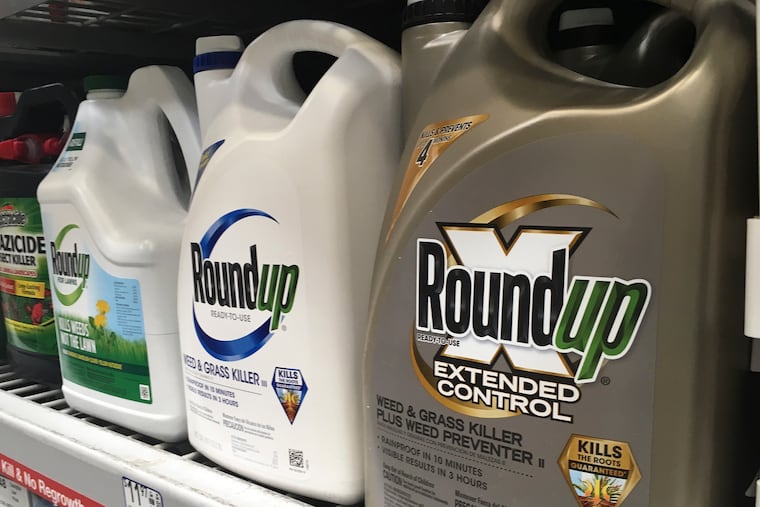Monsanto wins second Roundup case in Philadelphia, as jury finds the weed killer was defective but didn’t cause cancer
Monsanto, and parent company Bayer, will face a new Roundup trial next week.

A Philadelphia jury decided Wednesday that Roundup weed killer, manufactured by agricultural giant Monsanto, was defective but did not cause the cancer of a Pennsylvania man.
Ryan Young of Erie County sued Monsanto and its German parent company, Bayer, in 2022 in Common Pleas Court. He alleged that he developed non-Hodgkin’s lymphoma after using Roundup multiple times a year starting in 1998.
Monsanto is facing dozens of lawsuits making similar allegations. A Philadelphia jury awarded a Lycoming County man with a similar claim $2.25 billion last January. (A Philadelphia judge reduced the award to roughly $400 million in June.) Before that, Philadelphia juries awarded $175 million and $3.5 million to plaintiffs who claimed Roundup caused cancer.
But unlike in those cases, Young’s lawyers did not convince the jury that Roundup was the cause for his cancer, scoring Monsanto its second win in Philadelphia.
» READ MORE: Philadelphia judge reduces $2.25 billion verdict against Monsanto by more than 80%
The trial lasted nearly a month, and before sending the jury to deliberate, Judge Angelo Foglietta said it was one of the longest trials he oversaw during his tenure, according to a transcript of the proceeding.
The jury reached its decision, 11-1, after deliberating for one afternoon, finding that Monsanto was not negligent and that the Roundup product did not cause Young’s disease. But the jury also decided that Roundup was defective, that it did not include proper warnings, and that the company showed malice and/or indifference to others.
A spokesperson for Bayer said that the recent Philadelphia verdict is the “14th favorable outcome in the last 20 trials.”
“While we have great sympathy for anyone who suffers a loss or injury, the science proves that Roundup™ is not carcinogenic,” the company said in a statement.
In addition to Monsanto and Bayer, the lawsuit also named Nouryon, a Dutch chemical company with offices in Radnor that manufacturers an ingredient in Roundup that helps the herbicide effectively kill weeds. Nouryon, which did not respond to request for comment, was also cleared of negligence by the jury.
Andrew Kirkendall, founder of the Texas-based Kirkendall Dwyer law firm that represented Young, said in a statement that he was disappointed for his client but that the jury “did send a message to Monsanto that Roundup is defective.”
The Roundup legal saga is far from over. A new trial is scheduled to start Monday in Common Pleas Court, in a lawsuit brought by Kline & Specter lawyers who have won large verdicts against Monsanto. This time they represent an Abington man and his wife who contend his cancer was the result of Roundup use.
Monsanto asked Superior Court to halt the trial, citing a ruling last month by the U.S. Court of Appeals for the Third Circuit that said state law cannot require a more expansive pesticide warning label than the one approved by the Environmental Protection Agency. The state appeals court denied that request Wednesday and said it will consider the arguments on a non-expedited timeline, allowing the trial to proceed.